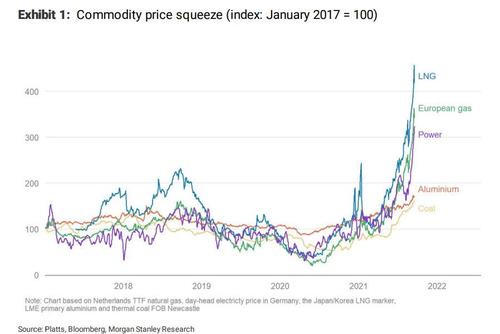See other World News Articles
Title: "What On Earth Is Going On In Commodities?"
Source:
[None]
URL Source: https://www.zerohedge.com/energy/wh ... dities-morgan-stanley-explains
Published: Sep 19, 2021
Author: Tyler Durden
Post Date: 2021-09-19 22:09:31 by Horse
Keywords: None
Views: 61
- Morgan Stanley Explains By Martijn Rats, Global Oil Strategist and Head of European Oil & Gas Equity Research at Morgan Stanley What on Earth Is Going on in Commodities? As the world embarks on its journey towards 'net zero', a few implications seem straightforward: coal should be oversupplied, natural gas should stay abundant and the marginal cost of electricity should approach zero as renewables take over. In the fullness of time, these propositions may well turn out to be correct, but the road between here and 'net zero' seems to have a few unexpected twists and turns. Take the current situation: global coal consumption peaked back in 2013, yet the price of thermal coal is currently close to its all-time high, having more than doubled in the last few months to ~US$180/tonne. The same has happened to liquefied natural gas (LNG), which has rallied from ~US$7 to ~US$20/mmbtu over the last few months – also an all-time high. European natural gas prices have risen in tandem, which in turn has driven a sharp spike in electricity prices: day-ahead prices across continental Europe have gone from ~€50 to ~€150/MWh – you guessed it, an all-time high. As a knock-on effect, aluminum prices have soared, from US$2,000/tonne at the start of the year to US$2,900/tonne today. This is unusual, especially because the global economy has yet to recovery fully from the COVID-19 crisis. So what is going on? A common set of factors ties these rallies together. As often happens, the story starts in China. The combination of a post-COVID-19 recovery and unusually hot weather has increased consumption of electricity sharply this year. Most of China’s electricity is produced from coal, but domestic coal production is increasingly struggling to keep up – the result of regulatory reforms, under-investment and more stringent HSE inspections. Another important source of electricity generation in China is hydropower, but because of droughts in key parts of the country, hydropower has failed to grow this year too. Over the summer, this led to power crunches that forced regional governments to curtail consumption – street lights were even switched off at night in a number of regions. Another victim of these measures was aluminum smelting, which is a particularly electricity-intensive process. Normally, China supplies ~60% of the world’s aluminum. With its production curtailed and global demand continuing to grow, aluminum prices soared. China’s domestic coal shortage compelled it to turn to the seaborne market. However, coal production elsewhere has also had its issues – e.g., heavy rains and staff shortages in Indonesia, railway disruptions in Russia and unrest in South Africa. As the seaborne coal market tightened, global coal prices rallied. The same factors drove up China’s demand for LNG, but here China was not alone. For example, droughts in Brazil also curtailed its production of hydropower, driving up LNG demand as well. With a number of production outages at liquefaction terminals, the global LNG market has tightened severely in the last few months. Europe is usually the end market for a substantial share of the world’s LNG. However, with other regions pulling harder, European LNG imports declined sharply this summer. At the same time, power generation from offshore wind disappointed – it has not been that windy in Europe recently – boosting demand for natural gas. Yet, with gas supply from Russia and other regions constrained, Europe was unable to build natural gas inventories as much as it normally does in the summer. European gas inventories are now unusually low for this time of the year, with winter yet to start. As natural gas prices largely set electricity prices, they have surged in tandem. So what does this all mean? We highlight three conclusions: First, this sequence of events shows how inter-connected commodity markets are. One region impacts another and multiple commodities are eventually linked. A drought in China can drive up the price of electricity prices in Spain but also the cost of soft drink cans in the US. Second, this year has shown how difficult it can be to anticipate such moves. Even a few months ago, the common view was that practically all these commodities were abundant, and would become more so over time. Finally, it shows how little margin of safety there is in the world’s energy system, and this has important implications for the future. Over the next few decades, the world will need to fundamentally retool the way it produces and consumes energy. So far, the supply side of the energy system is adjusting faster than our consumption patterns. The world is still in the early stages of its decarbonisation journey, so this creates the potential for further instability and squeezes in the future. Their impact could be felt well beyond the energy and commodities markets, impacting everything from growth to inflation to politics. Poster Comment: Parts of China had a drought but a lot was flooded hampering production and transport. 
Post Comment Private Reply Ignore Thread